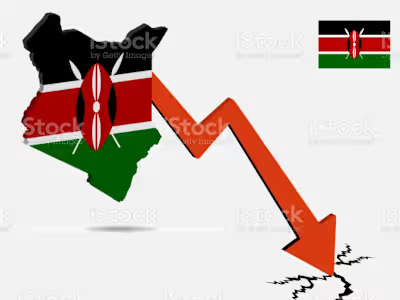Kenya’s Ongoing Economic Crisis
Kenya’s economy has been decelerating for quite sometimes now. It has a debt of about 1.27 trillion shillings and is expected to go even higher and this is not doing any good to Kenya’s economy. The Covid-19 global pandemic has impacted negatively to the economy since the measures taken to curb the spread in most sectors like closure of schools and entertainment sports, suspension of public gatherings and the night curfew affected the production and consumption sector.
The economy has primarily softened to lower agricultural output and weak private sector investment. In the past 5 years the Gross Domestic Product has been expanding at an average of 5.6 percent. The weakening of this sectors is from widening fiscal deficits and limited access to credit by private sectors. The Government total expenditure surpasses the revenue generated spends more money affects the economy by making the country to be on debt.
In the 2018 the economy activity was healthy but due to the emerging drought conditions could curtail Growth Domestic Product. It increased by 6.0 percent it was reflected by real growth in consume spending and stronger investor sentiment. The ongoing emergency intervention to address food shortages in several counties could impose fiscal pressure constraining to capital spending. Due to slowdown in food inflation which in turns offset a temporary acceleration in energy prices. It remains within government target range of 5 percent. With low inflation monetary policy could be more accommodative to support in growth need.
Kenya having an economic growth rates sustained at above 5 percent has outperformed the regional average. Robust domestic demand emerging from private consumption and government investment are the key drivers of growth, underpinned by stable macroeconomic environment, lower oil prices. Furthermore, currently the economy of Kenya has been halted by Fuel shortage, it is attributed by the delay in the payment of 13 billion subsidy funds to oil marketers by government. The fuel crisis affects the economy since the rising inflation as prices of basic commodities like cooking oil, bread hit the roof.
The economy is expected to achieve higher growth targets; however, the government will need to make a concerted effort. The Government needs to continue to invest in infrastructure to increase domestic energy production to address the other bottlenecks that affect the cost of doing business and to continue following monetary and fiscal.
Food prices have been increasing recently making a negative impact to the economy. The causes of food crisis and food insecurity including both demands side and supply factors negatively affects the Kenya’s economy. Due to rapid growth of population and declining in the agricultural productivity high input prices and the climate change and in agriculture underinvestment in agriculture, poor markets and market access by small holders’ farmers. The crisis manifests as high food prices, political instability increasing poverty.
The government needs to up with a plan to curb the constantly rising economy. They should focus majorly on Agriculture sector in order to solve the food crisis that is staggering the country’s growth. Nonetheless corruption among government officials should also not be left unchecked. It also should reduce the size of loans we get from outside.
Like this project
Posted May 22, 2024
Updates on the ongoing befalling economic crisis in kenya'





